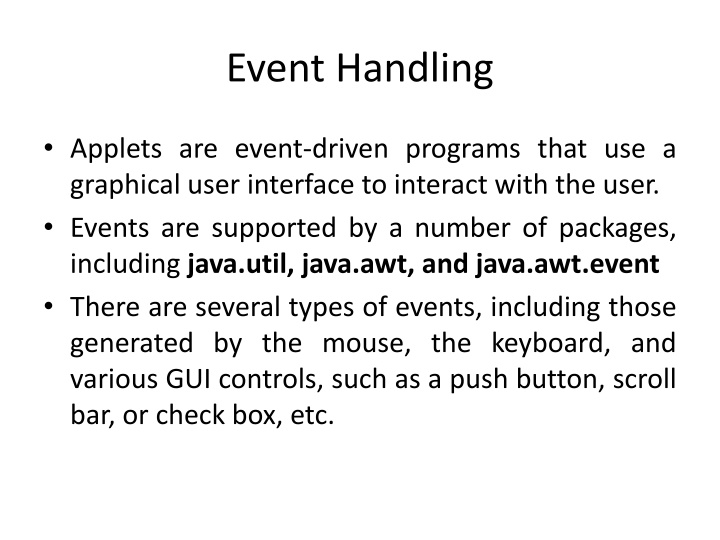
Event Handling in Java Applets
Explore the fundamentals of event-driven programming in Java applets, including the Delegation Event Model, event types, event sources, event listeners, and event classes. Learn how events are generated and processed in graphical user interfaces through examples and explanations.
Download Presentation

Please find below an Image/Link to download the presentation.
The content on the website is provided AS IS for your information and personal use only. It may not be sold, licensed, or shared on other websites without obtaining consent from the author. If you encounter any issues during the download, it is possible that the publisher has removed the file from their server.
You are allowed to download the files provided on this website for personal or commercial use, subject to the condition that they are used lawfully. All files are the property of their respective owners.
The content on the website is provided AS IS for your information and personal use only. It may not be sold, licensed, or shared on other websites without obtaining consent from the author.
E N D
Presentation Transcript
Event Handling Applets are event-driven programs that use a graphical user interface to interact with the user. Events are supported by a number of packages, including java.util, java.awt, and java.awt.event There are several types of events, including those generated by the mouse, the keyboard, and various GUI controls, such as a push button, scroll bar, or check box, etc.
The Delegation Event Model Defines standard and consistent mechanisms to generate and process events a source generates an event and sends it to one or more listeners. the listener simply waits until it receives an event. Once an event is received, the listener processes the event and then returns. In the delegation event model, listeners must register with a source in order to receive an event notification.
Events In the delegation model, an event is an object that describes a state change in a source. pressing a button, entering a character via the keyboard, selecting an item in a list, and clicking the mouse.
Event Sources A source is an object that generates an event. This occurs when the internal state of that object changes in some way. A source must register listeners in order for the listeners to receive notifications about a specific type of event. public void addTypeListener(TypeListener el) addKeyListener( ), addMouseMotionListener( ) public void removeTypeListener(TypeListener el)
Event Listeners A listener is an object that is notified when an event occurs. It has two major requirements. First, it must have been registered with one or more sources to receive notifications about specific types of events. Second, it must implement methods to receive and process these notifications.
The ActionEvent Class An ActionEvent is generated when a button is pressed, a list item is double-clicked, or a menu item is selected. ActionEvent(Object src, int type, String cmd) ActionEvent(Object src, int type, String cmd, int modifiers) ActionEvent(Object src, int type, String cmd, long when, int modifiers) String getActionCommand( ) int getModifiers( ) long getWhen( )
The AdjustmentEvent Class An AdjustmentEvent is generated by a scroll bar. There are five types of adjustment events. AdjustmentEvent(Adjustable src, int id, int type, int data)
The ComponentEvent Class A ComponentEvent is generated when the size, position, or visibility of a component is changed. ComponentEvent is the superclass either directly or indirectly of ContainerEvent, FocusEvent, KeyEvent, MouseEvent, and WindowEvent. ComponentEvent(Component src, int type) Component getComponent( )
The ContainerEvent Class A ContainerEvent component is added to or removed from a container. There are two types of container events: COMPONENT_ADDED and COMPONENT_REMOVED ContainerEvent(Component src, int type, Component comp) Container getContainer( ) Component getChild( ) is generated when a
FocusEvent Class A FocusEvent is generated when a component gains or loses input focus. FOCUS_GAINED and FOCUS_LOST
InputEvent Class InputEvent is a subclass of ComponentEvent and is the superclass for component input events. Its subclasses are KeyEvent and MouseEvent.
The ItemEvent Class An ItemEvent is generated when a check box or a list item is clicked or when a checkable menu item is selected or deselected. ItemEvent(ItemSelectable src, int type, Object entry, int state)
The KeyEvent Class A KeyEvent is generated when keyboard input occurs. There are three types of key events, which are identified by these integer constants: KEY_PRESSED, KEY_RELEASED, and KEY_TYPED. KeyEvent is a subclass of InputEvent. KeyEvent(Component src, int type, long when, int modifiers, int code, char ch) char getKeyChar( ) int getKeyCode( )
MouseEvent Class int getX( ), int getY( ), Point getPoint( ), void translatePoint(int x, int y), int getClickCount( ) int getButton( )
The TextEvent Class TEXT_VALUE_CHANGED TextEvent(Object src, int type)
The WindowEvent Class WindowEvent(Window src, int type)
The ActionListener Interface void actionPerformed(ActionEvent ae) The AdjustmentListener Interface void adjustmentValueChanged(AdjustmentEvent ae)
The ContainerListener Interface void componentAdded(ContainerEvent ce) void componentRemoved(ContainerEvent ce) The FocusListener Interface void focusGained(FocusEvent fe) void focusLost(FocusEvent fe) The ItemListener Interface void itemStateChanged(ItemEvent ie)
The KeyListener Interface void keyPressed(KeyEvent ke) void keyReleased(KeyEvent ke) void keyTyped(KeyEvent ke) The MouseListener Interface void mouseClicked(MouseEvent me) void mouseEntered(MouseEvent me) void mouseExited(MouseEvent me) void mousePressed(MouseEvent me) void mouseReleased(MouseEvent me) The MouseMotionListener Interface void mouseDragged(MouseEvent me) void mouseMoved(MouseEvent me)
MouseWheelListener Interface void mouseWheelMoved(MouseWheelEvent mwe) TextListener Interface void textChanged(TextEvent te) WindowFocusListener Interface void windowGainedFocus(WindowEvent we) void windowLostFocus(WindowEvent we)
WindowListener Interface void windowActivated(WindowEvent we) void windowClosed(WindowEvent we) void windowClosing(WindowEvent we) void windowDeactivated(WindowEvent we) void windowDeiconified(WindowEvent we) void windowIconified(WindowEvent we) void windowOpened(WindowEvent we)
Adapter Classes An implementation of all methods in an event listener interface. Adapter classes are useful when you want to receive and process only some of the events that are handled by a particular event listener interface. For example, the MouseMotionAdapter class has two methods, mouseDragged( mouseMoved( ), which are the methods defined by the MouseMotionListener interface. adapter class provides an empty ) and
